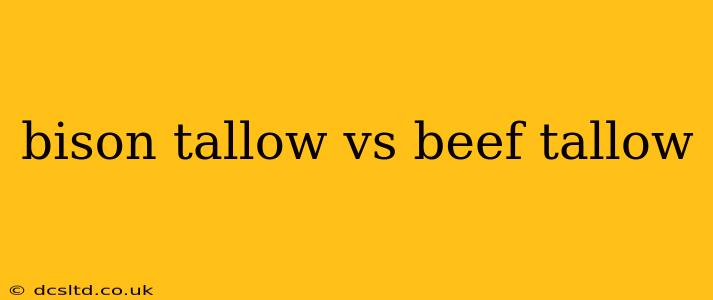For those seeking natural, high-quality fats for cooking, skincare, or other applications, both bison tallow and beef tallow are excellent options. However, there are subtle differences in their composition and properties that might make one a better choice than the other depending on your needs. This article delves into a detailed comparison of bison tallow and beef tallow, answering common questions and highlighting their unique characteristics.
What is Bison Tallow?
Bison tallow is rendered fat from the bison animal. It's gaining popularity as a healthy cooking fat due to its rich nutritional profile. Like beef tallow, it's high in saturated fat, primarily stearic acid, a saturated fat that the body converts to oleic acid (a monounsaturated fat). This conversion means it doesn't significantly raise LDL ("bad") cholesterol levels, a concern with some other saturated fats.
What is Beef Tallow?
Beef tallow, rendered from beef fat, is a traditional cooking fat used for centuries. It boasts a similar high saturated fat content to bison tallow but may have slightly different ratios of fatty acids. The exact composition can vary based on the animal's diet and breed.
What are the Differences Between Bison and Beef Tallow?
While both are excellent sources of saturated fat, subtle differences exist:
-
Fatty Acid Profile: While both are rich in saturated fats, the precise ratios of different fatty acids might vary slightly. This difference might influence their melting points and how they behave during cooking. More detailed research comparing the exact fatty acid profiles of bison and beef tallow from various sources would be needed to fully quantify these variations.
-
Flavor and Aroma: Many users report that bison tallow has a milder, slightly sweeter flavor than beef tallow. Beef tallow can have a more pronounced, beefy taste that some find appealing, while others may prefer the more neutral taste of bison tallow. This is highly subjective and depends on factors like the animal's diet and the rendering process.
-
Sustainability and Ethics: Bison are often raised on a more sustainable, grass-fed diet, which can influence the nutritional composition of their tallow. However, the ethical and environmental impact of beef and bison production depends heavily on individual farming practices. Consider looking for certified sustainable sources, regardless of the type of tallow.
-
Cost: Generally, bison tallow is more expensive than beef tallow due to the lower availability of bison compared to beef.
Is Bison Tallow Healthier Than Beef Tallow?
Determining whether bison tallow is definitively "healthier" than beef tallow is challenging. Both are rich in saturated fats, which have been the subject of much debate. Current research generally indicates that saturated fats aren't as detrimental to health as once believed, particularly when replacing less healthy fats. The relatively high stearic acid content in both suggests a less significant impact on LDL cholesterol compared to other saturated fats. However, more research directly comparing the health impacts of bison and beef tallow is needed for a definitive answer. A healthy, balanced diet is crucial regardless of the type of fat consumed.
What is the Best Way to Use Bison and Beef Tallow?
Both bison and beef tallow are versatile and can be used in various ways:
-
Cooking: Both are excellent for high-heat cooking, frying, sautéing, and baking. They offer high smoke points, making them ideal for searing and deep-frying.
-
Skincare: Their emollient properties make them suitable for use in lotions and balms, potentially benefiting skin health and hydration.
Where Can I Buy Bison and Beef Tallow?
Bison and beef tallow are becoming increasingly available online and at specialty stores that focus on natural and organic products. Look for reputable suppliers committed to sustainable and ethical practices.
Conclusion
Bison and beef tallow offer similar nutritional benefits, with subtle differences in flavor and cost. The "best" choice depends on individual preferences, dietary considerations, and ethical concerns. Research reputable suppliers and choose the option that aligns best with your needs and values. Remember that a balanced diet remains key to overall health and well-being.
